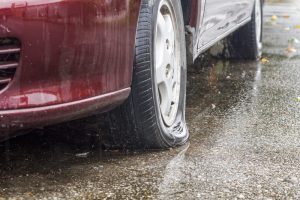In the old days, when a person went to fill up a vehicle, it was at a full service pump. The attendant pumped the desired level of gas, carefully washed the windshields (front and back), checked the oil under the hood and checked the tire pressure for you as well. Is it any wonder, that with today’s busy society, it is just enough to pump your gas yourself, and have to wait in a long line to pay for it inside, or pay with a credit card at the pump? Then who is checking your inflatable tire pressure? The answer is: you are.

Low Tire Pressure Accidents
There are gadgets that can be bought at tire and car part supply stores that you can utilize to check the tire pressure on your car. Of course, you can eye-ball your tire pressure to see if it is looking low, but this is not the preferred method of checking the pressure. If your tire looks flat, and the rim is nearly or close to touching ground, you will want to call for service immediately, or take measures to have the tire possibly changed.
But in the meantime, you will need to determine whether the tire pressure is correct on the four tires of your vehicle. This is an important step to keeping your car safe and must not be neglected.
Read the owners manual on what the tire pressure should be for your make and model car and for the tire brand you have on the vehicle. Then, follow the direction for checking the tire pressure. If you are not in the habit of regularly checking the tire pressure, you will not know that the tires are losing air or are operating at different pressures than the manufacturer recommends. When tires are under inflated, or in the alternative, over inflated, they might be more susceptible to placing you in the position of having an accident.
Tires that are operating with incorrect tire pressures might be unstable. In this case, the car will not operate as designed. Tire pressures that deviate from the suggested manufacture pressures could hamper your ability to maintain control of your vehicle. This is true in normal driving conditions, as well as in inclement weather (rain, sleet, snow or when driving on soft dirt, gravel or mud).
Incorrect tire pressure will also wear down your tires long before they were meant to wear out. Not only will it overly wear down the tires, but it will wear them down unevenly, which could eventually lead to tire failure.

